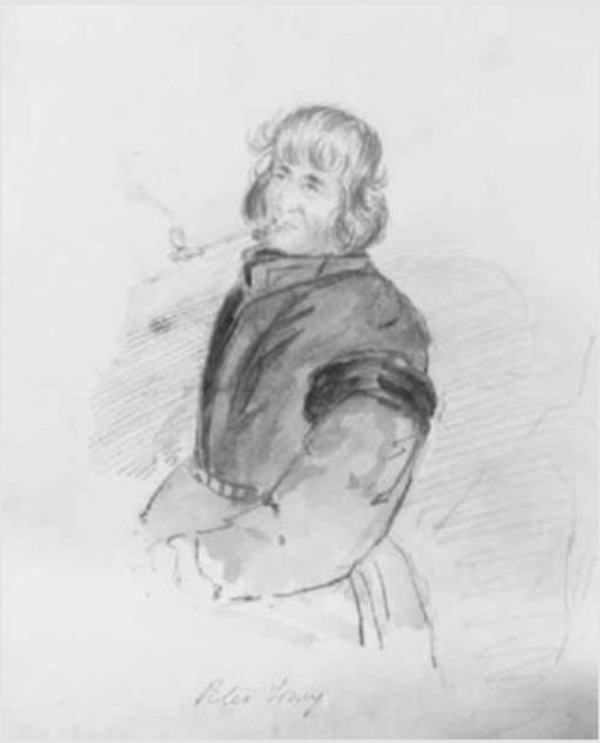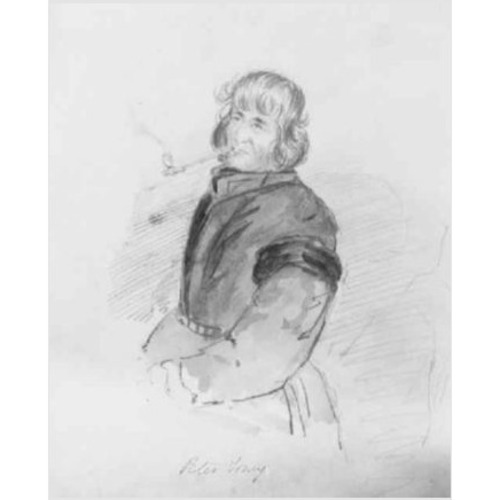
Source: Link
BABEY, PETER PAUL TONEY (also known as Peter Bobbeie), Micmac chief and doctor; fl. 1849–55 in Nova Scotia.
Peter Paul Toney Babey was born some time around the turn of the 19th century and by 1849 he was chief of the Micmac band living at Bear River in Kings County, N.S. At that point he was married and had a 13-year-old child. In an 1855 petition he is described as “Governor of the Aborigines of the Counties of Queen’s, Shelburne, Anapolis and King’s.”
On 26 Jan. 1842 Ebenezer Fitch Harding, justice of the peace for Kings, had reported to the House of Assembly that there were approximately 280 Micmacs living in the county and that their principal means of support came from hunting, fishing, coopering, basket making, and fancy quill work. He went on to say that they lived “in comparative comfort and contentment where they are temperate and sickness or old age do not prevent.” However, he lamented that they lacked “provident forethought” and were thus barred from the “accumulation of means for meeting future exigences.” He suggested that they be “relieved by a reasonable supply” of blankets, clothing, food, and medical help.
When famine hit the Micmacs in the mid 1840s the Nova Scotia House of Assembly agreed to pay the costs incurred by physicians who attended the indigent Indians. The bills began to come in with alarming frequency. Consequently, when Babey presented himself as a “phisician, Chemist, and Alchemist” in a petition to the house on 19 Feb. 1852 and asked for compensation such as the “white men who pretend to give any assistance to the poor Indian receives,” the members were not receptive. Babey claimed to have followed his vocation for over 25 years, ministering to Indians and, occasionally, whites, without pay. He used remedies extracted from plants, roots, and herbs because they “renovate the System, give Vigour to the frame, and have a tendency to prolong life.” In contrast, white doctors employed “minerals and noxious medicines calculated to destroy life.” The house debated his petition, with “a good deal of interest and some merriment.” After it was facetiously suggested that Babey be appointed physician to the assembly, providing he were of the right party, the house did nothing.
On 16 Jan. 1855 Babey presented a second petition, deploring the “rapid numerical decrease of his people” as increased settlement caused the “means by which [his] forefathers obtained a livelihood [to] disappear.” Claiming that he could no longer assist them because he lacked the financial means and had been “labouring under disease premature age and decripitude, often occasioned by want of food and raiment, and other privations incidental to life in the woods,” he asked that help be given to four Indians, each approximately 80 years of age, who were in a “sick state incapable of helping themselves.” The matter was referred to the Indian committee which, following Babey’s suggestion, agreed to send £4 for medicines to a clergyman in Liverpool to hold for Babey’s use. Unfortunately, there is no further record of Babey.
In 1857 the House of Assembly resolved to end the payment of doctors’ bills for attendance on Indians “except in cases of surgical operations or accouchements.” Under the direction of the Indian commissioner, William Chearnley, funds were to be spent primarily on the annual distribution of blankets and greatcoats.
PANS, MG 15, 3, no.74; 4a, no.126; 5, no.42. Novascotian, 1 March 1852. Upton, Micmacs and colonists.
Cite This Article
L. F. S. Upton, “BABEY, PETER PAUL TONEY (Peter Bobbeie),” in Dictionary of Canadian Biography, vol. 8, University of Toronto/Université Laval, 2003–, accessed February 17, 2026, https://www.biographi.ca/en/bio/babey_peter_paul_toney_8E.html.
The citation above shows the format for footnotes and endnotes according to the Chicago manual of style (16th edition). Information to be used in other citation formats:
| Permalink: | https://www.biographi.ca/en/bio/babey_peter_paul_toney_8E.html |
| Author of Article: | L. F. S. Upton |
| Title of Article: | BABEY, PETER PAUL TONEY (Peter Bobbeie) |
| Publication Name: | Dictionary of Canadian Biography, vol. 8 |
| Publisher: | University of Toronto/Université Laval |
| Year of publication: | 1985 |
| Year of revision: | 1985 |
| Access Date: | February 17, 2026 |



